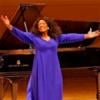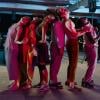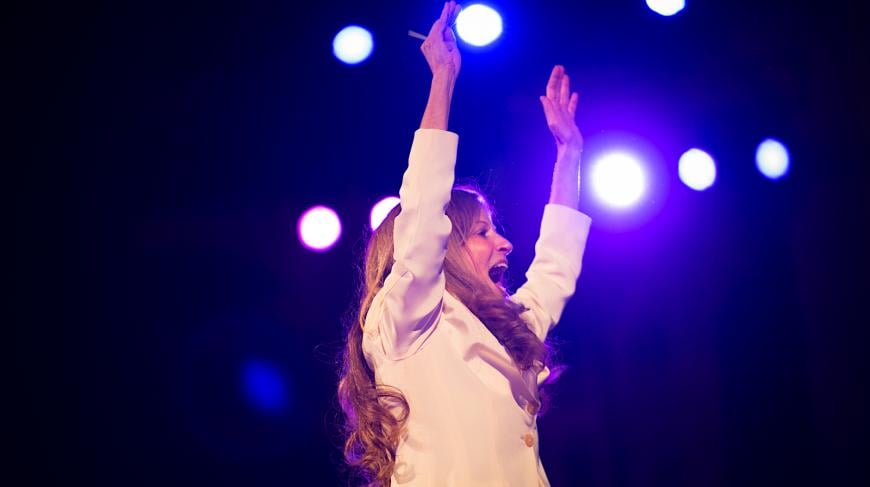
While most arts organizations around the country cancelled live performances during the global pandemic, Los Angeles-based conductor Rachael Worby, who founded the eclectic ensemble Muse/ique in 2011, carried on with in-person concerts. Presenting programs from backyards to drive-in movie theaters and parking lots, the ensemble’s indefatigable leader brought back joy when it was much needed. Indeed, her latest offering, “The House that Nat Built,” debuts Sept. 22–23 at the Huntington Library, Art Museum, and Botanical Gardens, with an additional performance at the Skirball Cultural Center, Sept. 26.
But bringing pleasure to countless music-lovers is nothing new to the maestra who was born in New York in 1950. Having earned a degree in piano performance from the Crane School of Music at the State University of New York at Potsdam and doing graduate work in musicology at Indiana University and Brandeis University, Worby has, through her commitment to community and arts education, served a music-loving public in a number of ways.
After working as a conducting assistant for the Spokane Symphony for two years, Worby became assistant conductor for the Los Angeles Philharmonic (1984–1987). That gig was followed by her serving 12 years as music director and conductor of the Young People’s Concerts at Carnegie Hall in the 1990s. The musician also raised her baton for 17 years as music director and conductor of Wheeling Symphony Orchestra in West Virginia. (On another note, Worby was married to the governor of that state, Gaston Caperton, from 1990–1998, but that’s another story.)
Then there was the decade Worby spent as music director of the Pasadena Pops, while her 15-year stint as music director for the late opera megastar, Jessye Norman, is as fascinating as the diva herself. In a wide-ranging phone conversation, among the topics Worby and I discussed were Muse/ique, Ms. Norman, and mounting the podium back in the day when females were somewhat of a rarity.
I understand that you may have given more performances in front of live audiences, during the pandemic, than most other arts entities in the country. How, pray tell, were you able to manage that?
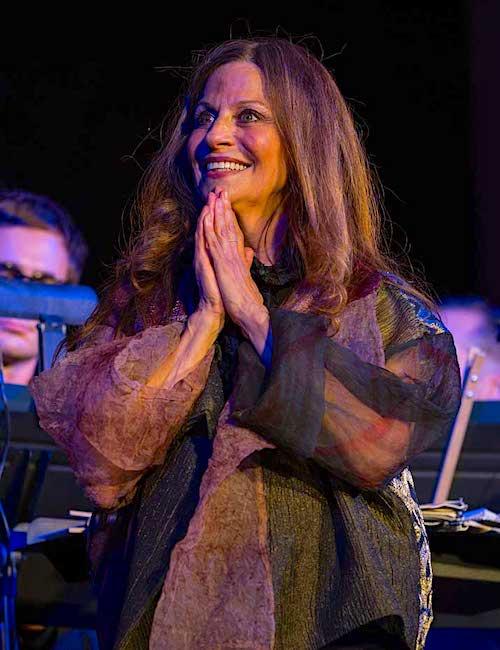
Part of that is when we were developing Muse/ique’s [original] plans, the notion was to create live artistic happenings everywhere in the community and to describe community as our stage. I’m using the word “community” in the broadest sense. But producing music in unconventional spaces has been our imprimatur — football fields, drive-in movie theaters — which we’ve been doing for the last 10 years.
So, when COVID shut everything down, we proceeded to do what we had always done, including performing in driveways. Muse/ique never acquired a traditional venue and never performed in a traditional venue, so when those were shuttered, we didn’t have to change anything at all. I know people have used the word “pivot,” but we were just business as usual and continued to make music.
How big were your audiences, I mean, how many folks can actually fit in a driveway?
Some were pretty massive driveways and [as for] audiences, sometimes there were only 12, but sometimes there were 312 — at drive-ins — when people were in their cars. There were 150 cars in a parking lot in the City of Industry. We knew the person who owned the parking lot — we have a lot of good friends — and people enjoyed the art of being ingenious and creative with us.
That’s one of the ways we got to see as many people as we did, because we did multiple performances, three concerts a night, where 150 cars would drive in and drive out. The more passion there was, it gave us more drive. All the musicians and I were emotionally attached to being able to continue to provide people with stuff for their souls during a time when people were terrified and starved in too many ways to describe.
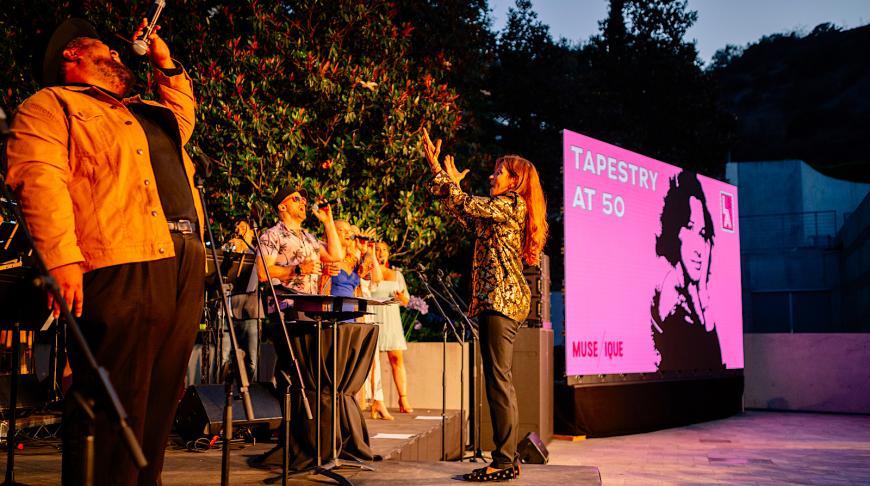
You were inspired by a diverse array of musicians — from Leonard Bernstein and Janis Joplin to the Weavers’ Ronnie Gilbert. How did your listening sensibilities inform your career?
My influences were far-ranging, and a lot of that is because my mother and father also had a love of different genres of music. They had a record player with those kinds of tall spindles that you could stack records on. On any Sunday morning, first would be Glenn Gould, record number two would be Sarah Vaughan, then there would be Brahms Fourth Symphony followed by Oscar Peterson. Record number six would be West Side Story, then the stack was picked up and turned over. This was “shuffle play” before there was “shuffle play” and it destroyed any notion of concept albums.
That is so cool. So, when did your craving to conduct enter the picture?
My desire to conduct is not separate from my desire to want to explore music, curate music, teach music, and give music. All of that is a combination of those artists about whom we just spoke, although my parents didn’t listen to Janis Joplin! It was all said through the avatar of Bernstein and art as a democracy, where the Beatles and Bob Dylan are up there with Shostakovich and Bach. Bernstein raised me up and I didn’t know any differently than that.
High art and low art did not exist in his vocabulary and they don’t exist in mine. He was about great and less great; great and not great. I don’t think he thought about whether or not there was a difference between Thelonious Monk as a composer/pianist and Bach. He was able to listen to all of that music with the same ear and come to the same kind of magnificent conclusion that it was great.
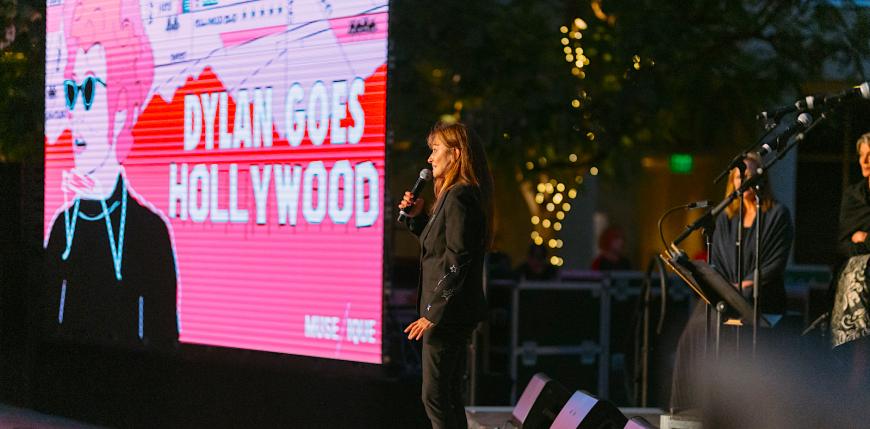
That’s certainly apparent with Muse/ique, which you’ve characterized as bringing together “a collection of the best artists from the worlds of the orchestra, jazz, rock, blues, gospel, and more.” Your recent concerts explored the music of Carole King and Bob Dylan, all under the banner of “L.A. Composed: A Festival of Los Angeles Music.” And now you’re on a tear with Nat King Cole. What can audiences expect from this tribute to the iconic crooner, jazz pianist, and actor?
In the early months of 2021, we decided that we would devote the next 18 months to a discovery of the arts from which L.A. is composed, both artists and the arts. Carole King came out of Topanga, Dylan from a Hollywood studio. L.A. is the place that made Nat. He was on a tour with an African-American review, “Shuffle Along,” and that tour fell apart in Long Beach. He was an 18-year-old pianist and had been stranded in L.A. [where] he played in clubs for five bucks a night. He put together a quartet and then the Nat King Cole trio, which became the [model] for every jazz trio to follow.
He was a genius pianist who only began to sing by happenstance. When NBC put him on TV in 1956, it seems to me, now that I’ve looked at it as much as I have, that it was a natural progression. He was an international star, everybody listened to him, adored him. He was almost the Jackie Robinson of TV. In some ways, it was probably the brightest light shone on any African American and only he could have handled that with that kind of grace and ease. He was a natural.
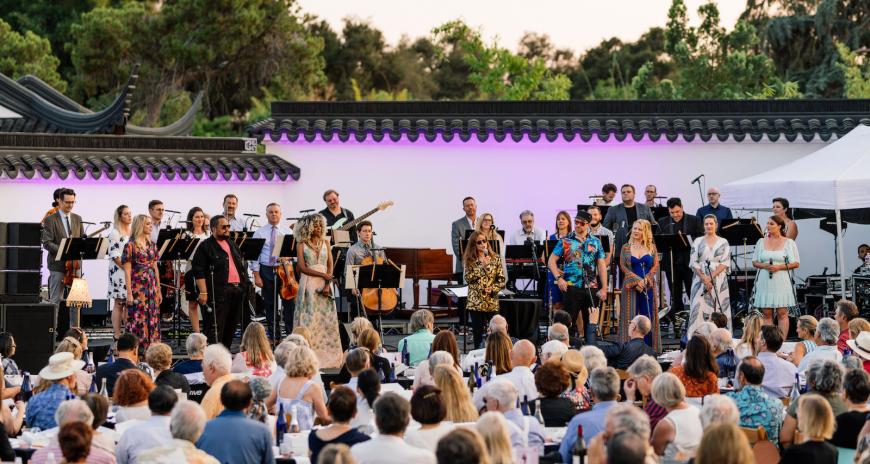
You’ll be offering a selection of Cole’s greatest hits, with Hamilton alums, Julia Harriman and Joshua Henry on the bill, as well as the added attraction of Lula Washington Dance Theatre.
I’ve worked with Josh several times and we often spoke about putting together an homage to Nat, but our schedules never worked out and now they do. [With] Lula, her company’s been going for 41 years and she’s her own force of nature, so when I discussed with her Nat King Cole, I just said, “Nature Boy” and “Route 66,” and she said, “OK!”
And you said “OK” to Jessye Norman in a phone call that changed your life. How did that relationship come about?
It was during the last years of the Pasadena Pops and a friend who knew my work said to Ms. Norman — you always called her Ms. Norman — “You need a conductor who’s a force of nature to train an orchestra before you get there,” because one of the challenges that she was encountering was showing up for rehearsals and they were playing the music for the first time, or they didn’t know how to read her signals. So, one day I received a call at the old Pasadena Pops offices.
“Hello, Ms. Worby, this is Jessye Norman. I’m telephoning form Paris, I’m here with Boulez for Bluebeard’s [Castle]. I’ve been invited to make my debut in mainland China and I wonder if you would like to accompany me.”
Sounds like she made you an offer you couldn’t refuse. What was it like working with her?
She [first] came to L.A. for a week and a collaborative pianist and I found a piano that was suitable for her and we worked through all the repertory. The first time I met her was at Shutters Hotel in Santa Monica [which has] a massive Steinway. She just walked in and we stayed for three hours. I made all the notes I needed, I flew to [China] and rehearsed with the orchestra three or four times and she showed up for the last rehearsal. She sang through all her repertory in 40 minutes and we proceeded to make the concert. That’s how it went ever after.
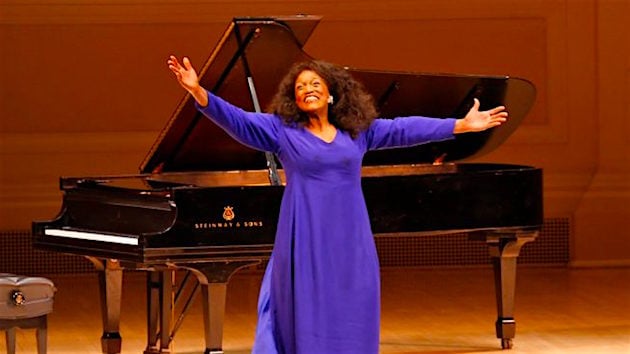
Happily ever after, it would seem, as Ms. Norman graciously sang on Muse/ique’s inaugural concert in July, 2011, with the Los Angeles Times’ Chris Pasles writing, “The low-peaked roof of Caltech’s Beckman Auditorium blew off its spindly columns as soprano Jessye Norman unleashed her amazing powers.” She also performed at an inner-city high school at your suggestion.
I do not know what got into me, but one day I said to her, “I have an idea. What if I took you to an inner-city high school with an orchestra and the people who were invited were students. We deconstructed what you were singing and we presented lots of music they could understand.” She interrupted and said, “Here’s my schedule, tell me when.”
What ended up happening, there were 10 couples who donated the same amount of money they would have if we did this in somebody’s living room. Instead, they got to watch 1200 diverse L.A. high-school students have their minds blown and their lives changed. When Jessye Norman walked in singing “Somewhere” [from West Side Story], to say you could hear a pin drop — it was more like the absence of sound. The only sound was the orchestra and her feet moving on the basketball floor.
Ms. Norman died in 2019 at age 74. You must miss her, not only as a colleague, but as a friend.
We spoke on the phone every day and we emailed a lot. Her politics and mine were almost perfectly aligned and what we loved in art and artists we loved also. It’s a big missing piece in my life. The last two years of her life were difficult, but on the phone she was still full of life, full of rage at Trump, and there was laughter at other things.
With you having achieved so much yourself, do you have any advice for aspiring female conductors?
It’s hard for me to put into words, but one thing I’ve been thinking about myself lately, is, “I simply proceed.” Nobody ever gave me any advice. My first conducting teacher told me to bind my breasts and put my hair in a tight bun, so no one would know I was a woman. The glory is in everything you get to do before you even encounter a musician, let alone an audience. The glory is in the study and the work, in knowing that you have the fortitude and the discipline and the talent to understand all of those little black dots and all of those words. It’s not about who’s in front of you, it’s not about who’s behind you, it’s about who’s inside of you.



